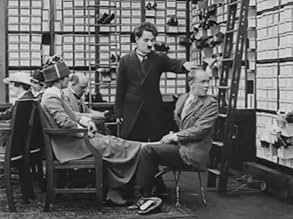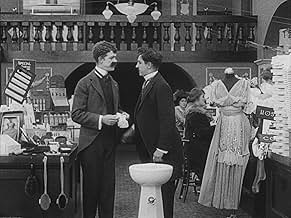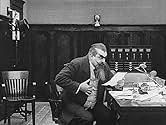IMDb रेटिंग
6.6/10
2.8 हज़ार
आपकी रेटिंग
अपनी भाषा में प्लॉट जोड़ेंThe Tramp is tricked into impersonating an embezzling floorwalker in a department store.The Tramp is tricked into impersonating an embezzling floorwalker in a department store.The Tramp is tricked into impersonating an embezzling floorwalker in a department store.
- निर्देशक
- लेखक
- स्टार
Henry Bergman
- Old Man
- (बिना क्रेडिट के)
Frank J. Coleman
- Janitor
- (बिना क्रेडिट के)
Fred Goodwins
- Shoe clerk
- (बिना क्रेडिट के)
Bud Jamison
- Small Role
- (बिना क्रेडिट के)
Tom Nelson
- Detective
- (बिना क्रेडिट के)
Wesley Ruggles
- Policeman
- (बिना क्रेडिट के)
फ़ीचर्ड समीक्षाएं
The Little Tramp is mistaken for an embezzling floorwalker. Charlie Chaplin's first film for Mutual, and the first ever to feature an escalator, which provides the comical maestro with plenty of funny material to mine. The lookalike actor who plays the crooked store employee with whom Chaplin exchanges identities is Lloyd Bacon, who would go on to direct almost 100 movies including 42nd Street and Footlight Parade. The Floorwalker is a decent enough entry on Chaplin's CV, but it would have benefited from being 10 minutes shorter - the middle section drags a little - and it ends rather abruptly, suggesting that the final scenes have been lost.
Although Charlie Chaplin made some great short comedies in the late 1910's, others don't quite make it. Examples like His New Job and Shanghaied come to mind, and I would also The Floorwalker in this category.
Charlie gets mistaken for a manager of a department store (and vice versa). This manager tries to steal money from the cash register and make a run for it, and Charlie is just an honest costumer but getting blamed for some missing objects, stolen by other costumers.
There aren't many laughs in it, except for the last couple of minutes or so with some great scenes on the escalator. For the rest, quite disappointing.
4/10.
Charlie gets mistaken for a manager of a department store (and vice versa). This manager tries to steal money from the cash register and make a run for it, and Charlie is just an honest costumer but getting blamed for some missing objects, stolen by other costumers.
There aren't many laughs in it, except for the last couple of minutes or so with some great scenes on the escalator. For the rest, quite disappointing.
4/10.
A floorwalker, Lloyd Bacon, and manager, Eric Campbell, rob the safe of a department store. Before they can leave with their ill-gotten gains, the floorwalker knocks the manager out and steals his share. To evade detectives, the floorwalker induces a look-alike tramp, Charlie Chaplin, to trade places with him. When the detectives arrest the real floorwalker, Chaplin is left with a suitcase of money and one small problem: Eric wants the money and revenge.
"The Floorwalker" was the first of Chaplin's twelve two-reel films for the Mutual Company. These are perhaps the best series of two-reel silent comedies. Chaplin made great strides as film maker during this period, and laid the groundwork for his feature-length triumphs to come.
The difference between the Mutual films and his Essanay films of the previous year are obvious from the start. The technical quality of the film making in almost all categories increases, and, although there are some notable holdovers from Essanay, especially leading- lady Edna Purviance, the quality of his stock company at Mutual also improves. "The Floorwalker" gives us the debut of Eric Campbell, Chaplin's best heavy, and Albert Austin, another stalwart foil. Most importantly, the level of humor rises from the rough, knockabout slapstick of his earliest films.
"The Floorwalker" is more heavily-plotted than most of his earlier shorts. It uses Chaplin's common plot device of mistaken identity which he frequently employed from 1914's "Caught in a Cabaret" to 1940's "The Great Dictator." This device allowed his tramp "everyman" to get a taste of the lifestyle of the rich and stuffy. This time he doesn't reach as high - merely to the ranks of the employed. The gags are good, in particular Chaplin makes excellent use of an escalator, although the film isn't as funny as many that will soon follow. Still, "The Floorwalker" remains one of my favorite Mutuals, if only for the sentimental reason that it was the first full-length two- reeler I bought in Super 8mm when I was a kid.
Well worth a look, but not the best introduction to Chaplin.
"The Floorwalker" was the first of Chaplin's twelve two-reel films for the Mutual Company. These are perhaps the best series of two-reel silent comedies. Chaplin made great strides as film maker during this period, and laid the groundwork for his feature-length triumphs to come.
The difference between the Mutual films and his Essanay films of the previous year are obvious from the start. The technical quality of the film making in almost all categories increases, and, although there are some notable holdovers from Essanay, especially leading- lady Edna Purviance, the quality of his stock company at Mutual also improves. "The Floorwalker" gives us the debut of Eric Campbell, Chaplin's best heavy, and Albert Austin, another stalwart foil. Most importantly, the level of humor rises from the rough, knockabout slapstick of his earliest films.
"The Floorwalker" is more heavily-plotted than most of his earlier shorts. It uses Chaplin's common plot device of mistaken identity which he frequently employed from 1914's "Caught in a Cabaret" to 1940's "The Great Dictator." This device allowed his tramp "everyman" to get a taste of the lifestyle of the rich and stuffy. This time he doesn't reach as high - merely to the ranks of the employed. The gags are good, in particular Chaplin makes excellent use of an escalator, although the film isn't as funny as many that will soon follow. Still, "The Floorwalker" remains one of my favorite Mutuals, if only for the sentimental reason that it was the first full-length two- reeler I bought in Super 8mm when I was a kid.
Well worth a look, but not the best introduction to Chaplin.
This is the first picture Charlie Chaplin made at Mutual studios. After a year-long maturing period at Essanay, he had at last set off in search of greater creative freedom and vastly inflated salaries. This is precisely what Mutual gave him.
The most obvious difference between the Floorwalker and the shorts that went before it is the level of confidence and cinematic professionalism Chaplin now displays. There is a lengthy opening sequence before the little tramp even appears, establishing the antagonists and the scam in which Charlie will later become embroiled. Eric Campbell is introduced with a formidable close-up, giving him a more menacing and memorable entrance. There's also a bit of bold cross-cutting, some of which becomes a joke in itself. For example, we cut back-and-forth from Albert Austin tussling with the essentially harmless Charlie, while behind his back a gang of thieves rob the store blind. That particular gag also shows his willingness to sometimes move the camera away from himself, making his little tramp the cause of the comedy but not the focus of it. These were all techniques Chaplin had used before, but never quite to this extent or with this much bravura.
With a new studio came new supporting actors, and here we see the introduction of two very important figures in the Chaplin career. Most noticeable of these was the stupendous Eric Campbell, who fulfilled in the Mutual films the role of the bully. Campbell's appeal works on the old adage of "the bigger they come the harder they fall", but he's also a wonderfully expressive comedy character, all his movements looking comically exaggerated because of his size. The floorwalker also marks the debut of Albert Austin, who does a similar job to that of Billy Armstrong in the Essanays, that is, a lanky twerp for Charlie to wind up. He makes a good impression here, tumbling helplessly and striving to maintain his dignity. Fortunately, Chaplin brought across some of his best collaborators from the Essanay days, but Leo White and even Edna Purviance get a bit lost among all the new faces here. Honourable mentions go to Charlotte Mineau and Lloyd Bacon, both of whom had bit parts in a few Essanay pictures, now appearing in meatier roles.
In spite of its technical polish and auspicious debuts, it has to be said that the Floorwalker is one of the less entertaining Mutual pictures. It has its moments (surely the best of which is Charlie's "mirror-image" routine with Lloyd Bacon, repeated years later by the Marx brothers in Duck Soup), but there is bit too much going on and a few too many characters, with not enough high quality comedy in between. Chaplin would have to do a little better than this to justify his hefty new pay packet.
Still, let us not forget that all-important statistic – Number of kicks up the arse: 6 (3 for, 3 against)
The most obvious difference between the Floorwalker and the shorts that went before it is the level of confidence and cinematic professionalism Chaplin now displays. There is a lengthy opening sequence before the little tramp even appears, establishing the antagonists and the scam in which Charlie will later become embroiled. Eric Campbell is introduced with a formidable close-up, giving him a more menacing and memorable entrance. There's also a bit of bold cross-cutting, some of which becomes a joke in itself. For example, we cut back-and-forth from Albert Austin tussling with the essentially harmless Charlie, while behind his back a gang of thieves rob the store blind. That particular gag also shows his willingness to sometimes move the camera away from himself, making his little tramp the cause of the comedy but not the focus of it. These were all techniques Chaplin had used before, but never quite to this extent or with this much bravura.
With a new studio came new supporting actors, and here we see the introduction of two very important figures in the Chaplin career. Most noticeable of these was the stupendous Eric Campbell, who fulfilled in the Mutual films the role of the bully. Campbell's appeal works on the old adage of "the bigger they come the harder they fall", but he's also a wonderfully expressive comedy character, all his movements looking comically exaggerated because of his size. The floorwalker also marks the debut of Albert Austin, who does a similar job to that of Billy Armstrong in the Essanays, that is, a lanky twerp for Charlie to wind up. He makes a good impression here, tumbling helplessly and striving to maintain his dignity. Fortunately, Chaplin brought across some of his best collaborators from the Essanay days, but Leo White and even Edna Purviance get a bit lost among all the new faces here. Honourable mentions go to Charlotte Mineau and Lloyd Bacon, both of whom had bit parts in a few Essanay pictures, now appearing in meatier roles.
In spite of its technical polish and auspicious debuts, it has to be said that the Floorwalker is one of the less entertaining Mutual pictures. It has its moments (surely the best of which is Charlie's "mirror-image" routine with Lloyd Bacon, repeated years later by the Marx brothers in Duck Soup), but there is bit too much going on and a few too many characters, with not enough high quality comedy in between. Chaplin would have to do a little better than this to justify his hefty new pay packet.
Still, let us not forget that all-important statistic – Number of kicks up the arse: 6 (3 for, 3 against)
Am a big fan of Charlie Chaplin, have been for over a decade now. Many films and shorts of his are very good to masterpiece, and like many others consider him a comedy genius and one of film's most important and influential directors.
From his post- Essanay period after leaving Keystone, 'The Floorwalker' is not one of his very best or even among the best of this particular period. It shows a noticeable step up in quality though from his Keystone period, where he was still evolving and in the infancy of his long career, from 1914, The Essanay period is something of Chaplin's adolescence period where his style had been found and starting to settle. Something that can be seen in the more than worthwhile 'The Floorwalker'.
'The Floorwalker' is not one of his all-time funniest or most memorable, other efforts also have more pathos and a balance of that and the comedy. The story is still a little flimsy, there are times where it struggles to sustain the short length, and could have had more variety and less more of the same repeition.
On the other hand, 'The Floorwalker' looks pretty good, not incredible but it was obvious that Chaplin was taking more time with his work (even when deadlines were still tight) and not churning out as many countless shorts in the same year of very variable success like he did with Keystone. Appreciate the importance of his Keystone period and there is some good stuff he did there, but the more mature and careful quality seen here and later on is obvious.
While not one of his funniest or original, 'The Floorwalker' is still very entertaining with some clever, entertaining and well-timed slapstick. It moves quickly and there is no dullness in sight.
Chaplin directs more than competently, if not quite cinematic genius standard yet. He also, as usual, gives an amusing and expressive performance and at clear ease with the physicality of the role. The supporting cast acquit themselves well.
Summing up, worth a look though Chaplin did better. 7/10 Bethany Cox
From his post- Essanay period after leaving Keystone, 'The Floorwalker' is not one of his very best or even among the best of this particular period. It shows a noticeable step up in quality though from his Keystone period, where he was still evolving and in the infancy of his long career, from 1914, The Essanay period is something of Chaplin's adolescence period where his style had been found and starting to settle. Something that can be seen in the more than worthwhile 'The Floorwalker'.
'The Floorwalker' is not one of his all-time funniest or most memorable, other efforts also have more pathos and a balance of that and the comedy. The story is still a little flimsy, there are times where it struggles to sustain the short length, and could have had more variety and less more of the same repeition.
On the other hand, 'The Floorwalker' looks pretty good, not incredible but it was obvious that Chaplin was taking more time with his work (even when deadlines were still tight) and not churning out as many countless shorts in the same year of very variable success like he did with Keystone. Appreciate the importance of his Keystone period and there is some good stuff he did there, but the more mature and careful quality seen here and later on is obvious.
While not one of his funniest or original, 'The Floorwalker' is still very entertaining with some clever, entertaining and well-timed slapstick. It moves quickly and there is no dullness in sight.
Chaplin directs more than competently, if not quite cinematic genius standard yet. He also, as usual, gives an amusing and expressive performance and at clear ease with the physicality of the role. The supporting cast acquit themselves well.
Summing up, worth a look though Chaplin did better. 7/10 Bethany Cox
क्या आपको पता है
- ट्रिवियाThis film was noted for the first "running staircase" (escalator) used in films.
- गूफ़There's only one escalator (going up), with none going down--and no visible stairs to boot.
- इसके अलावा अन्य वर्जनKino International distributes a set of videos containing all the 12 Mutual short films made by Chaplin in 1915 - 1917. They are presented by David Shepard, who copyrighted the versions in 1984, and has a music soundtrack composed and performed by Michael Mortilla who copyrighted his score in 1989. The running time of this film is 24 minutes.
- कनेक्शनEdited into The Chaplin Cavalcade (1941)
टॉप पसंद
रेटिंग देने के लिए साइन-इन करें और वैयक्तिकृत सुझावों के लिए वॉचलिस्ट करें
- What are "Spondulicks"?
- How many titles feature the "mirror gag"?
विवरण
- चलने की अवधि29 मिनट
- रंग
- ध्वनि मिश्रण
- पक्ष अनुपात
- 1.33 : 1
इस पेज में योगदान दें
किसी बदलाव का सुझाव दें या अनुपलब्ध कॉन्टेंट जोड़ें

































